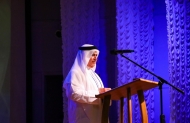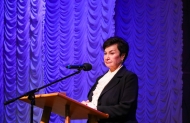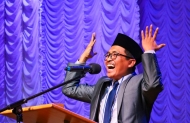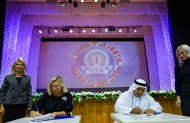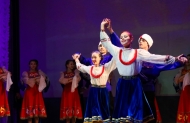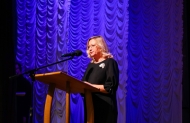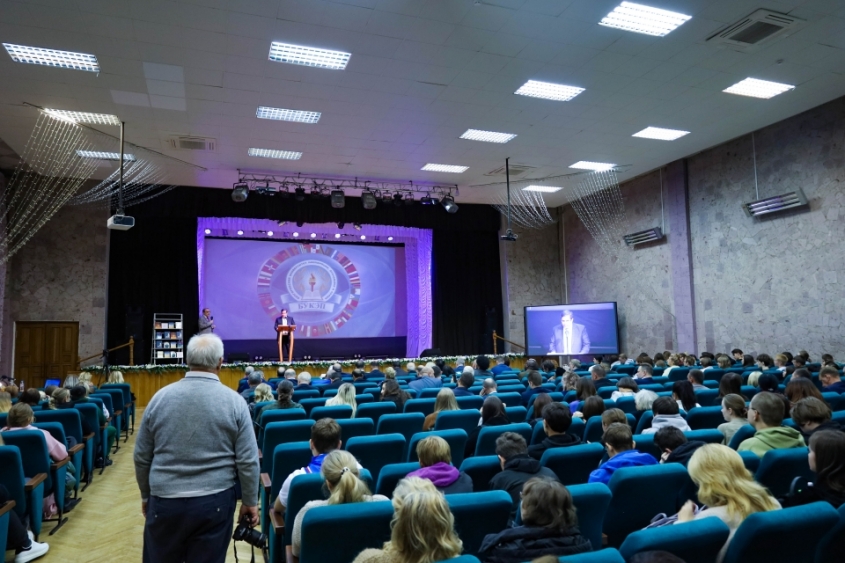
On the sidelines of the III International Forum “Truth and Morality - a Strategic Resource of Public Diplomacy” at the Belgorod University of Cooperation, Economics and Law (BUKEP), a lot of work was done during the International Conference “The Role of Public Diplomacy Institutions in the Formation of New Protocols for International Interaction.”
Rector, Doctor of Economics, Professor Elena Isaenko addressed the organizers and guests of the Forum with a welcoming speech. In her speech, she noted the increasing role of educational institutions in the development of public diplomacy.
“The role of universities as institutions of public diplomacy is to further strengthen international cooperation. It is confirmed by the implementation of a number of areas. This is, first of all, the implementation of joint educational programs, internships, joint scientific research, and cultural events,” - said Elena Isaenko.
Secretary General of the Eurasian Peoples' Assembly Andrei Belianinov noted that the conference brought together representatives of 40 countries to discuss important issues and global problems. He called on young people to be proud of their country, culture, and build friendly relations with each other and with the whole world.
“Today there are many graduates of Soviet and Russian universities among those present. They admit that they do not know which country is closer to them (note – Soviet Union or Russia). We really appreciate it... When we talk about friendship, we talk about the feeling that we have carried through the years. Treasure friendship and live in peace, goodness and harmony,” - Andrei Yuryevich admonished the young participants of the conference.
Senator of the Parliament of the Arab Republic of Egypt Mr. Elsayed Abdelal Mustfa Kamel Abdelmagid noted that public diplomacy does not replace official diplomacy, but contributes to solving many global problems.
“Public diplomacy cannot replace official diplomacy. Public diplomacy is based on comprehensive dialogue. We are talking about the fact that it contributes to solving many of the problems that we currently face,” - said the Senator of the Egyptian Parliament.
President of the International Institute of Cultural Diplomacy (United Arab Emirates) Dr. Mohammed Kamil Al Muaini said that the motto of their institute is “We build bridges that lead to the future!” He also outlined three leitmotifs of the forum: unification, interaction and focus on the future, and cultural diplomacy is a force that promotes development, unification and movement forward.
“Through cultural diplomacy, we have the opportunity to expand our relationships with other countries. Through cultural diplomacy we try to organize our speech in such a way that words reach people and are understood unambiguously,” - emphasized Dr. Mohammed Kamil Al Muaini.
UNESCO Goodwill Ambassador, co-chairman of the General Council of the Eurasian Peoples' Assembly, member of the State Commission of the Russian Federation for UNESCO Alexandra Ochirova focused on the fact that such concepts as “morality” and “truth” are not used as regulators in the modern world. She emphasized the importance of forming a new world agenda based on the value of human life.
“...There is a question that I am very concerned about: how much the modern world corresponds to human nature and what is the fate of the meanings that have been passed down from generation to generation... As we know, when meanings collapse, then civilizations collapse. And today we are very close to such a situation,” - concluded the UNESCO Goodwill Ambassador.
The President of Damascus University (Syrian Arab Republic), the largest university in the Middle East, with 420 thousand students, Dr. Mohammad Osama al-Jabban expressed gratitude to Russia for its support, and also noted the great role of universities, knowledge and youth in the development of the economies of states. The expert emphasized the role of BRICS in solving global problems.
“Universities, students and knowledge play a big role in solving public issues. Our goal is to serve our people. Our university today has a slogan: students serve the people. And we must support each other in such difficult times. We really hope for the union of the BRICS countries, especially in the economic sphere,” - said the distinguished speaker.
Vice-Rector of Nahdatul Ulama University of Yogyakarta (Indonesia) Dr. Ami Maulana noted the similarity between Indonesia and Russia, which lies in multi-ethnicity, diversity of languages and religions. This, in his opinion, will be the point of unity of our peoples and countries.
“Russia and Indonesia have many similarities. But the main thing is that Indonesia, like Russia, is diverse. There are more than 300 different tribal and ethnic groups in Indonesia. Each of them is distinguished by the presence of its own language. In total, Indonesians speak more than 700 languages. Russia is also a multinational, multi-religious country and this will be the main points of our diplomacy,” - said Ami Maulana.
Director General of the Center for Geostrategic Research of Serbia (Republic of Serbia), Ms. Dragana Trifković, thanked Russia for its support and expressed hope for further cooperation, concluding her speech with the following words: “We have a saying in Serbia: God is in heaven, and Russia is on earth. Thank you for your support."
Plenipotentiary Minister, Consul General of the Embassy of the Republic of Kenya Mr. Maurice Okoch Okomo Amisi focused on the need to exchange cultural codes between countries, and also noted the qualities that Russians admire him - patriotism and the ability to unite in difficult situations.
Member of the House of Representatives of the Arab Republic of Egypt Ms. Sana Ahmed Mohamed Gamaleldin emphasized the long-term diplomatic relations between Russia and Egypt and noted the need to join forces in solving global problems. She also emphasized the cooperation of the countries in education and expressed a desire to see Russian youth in Egypt.
The conference ended with the conclusion of cooperation agreements between the Belgorod University of Cooperation, Economics and Law (BUKEP) (Russia) with Nahdlatul Ulama University of Yogyakarta (Indonesia), Damascus University (Syria), Ajloun National University (Jordan), the International Institute of Cultural Diplomacy (UAE) and the Jordanian University (Jordan).




